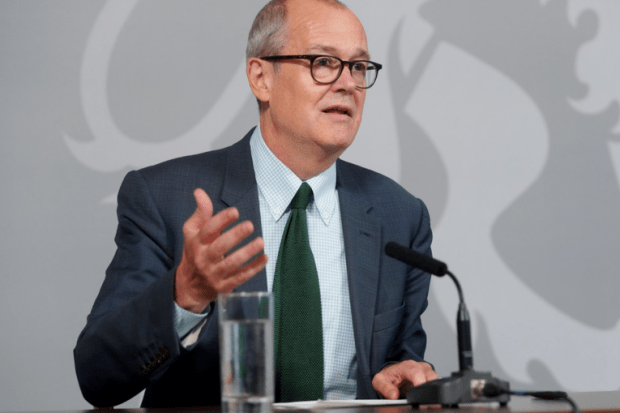Science minister Patrick Vallance has said he is more focused on ensuring the UK’s research budget is spent effectively than securing the biggest possible budget for his department.
Asked how his time in office might be judged in a year’s time, the former chief scientific adviser turned minister told the House of Commons’ Science and Technology Committee that he “did not agree” with the view – expressed recently by former science minister David Willetts – that the “job of a science minister is to get the biggest budget for science”.
“Of course, I would like to get a big budget but that is an input measure,” argued Vallance at the hearing on 11 February.
“What we need to ensure is that we get the best possible use of that money to get the maximum effect for the UK.”
In his first six months since taking office in July 2024, Vallance won praise for helping secure what he described at the committee as a “good spending review settlement during a very tight budget situation” that saw the budget for Department for Science, Innovation and Technology (DSIT) increase to £13.9 billion in 2025-26, of which £6.1 billion is for “core research funding” covering Research England, research councils, UK Research and Innovation (UKRI) talent funding and national academy funding.
While that settlement in October was seen as having avoided up to £1 billion of cuts that could have occurred if DSIT had been asked to absorb the costs of Horizon Europe association without a budget uplift, there are still major concerns over potential research cuts, with details of UKRI’s 2025-26 budget yet to be confirmed weeks from the start of the financial year.
On his priorities at DSIT, Vallance explained that it was important to “protect and grow, as the economy allows us to grow, basic curiosity-driven investigator-led research”.
“That brings no economic value in the next five years, but it is the thing that people will be extremely grateful for in 20 to 30 years’ time,” he said. “It is something we are really good at and it’s the foundation for everything else.”
In other research areas, however, Vallance argued that “more applied research should be aligned to government ambitions – growth ambitions, industrial strategy ambitions”.
“Not only do we expect it be aligned, we would expect it to get leverage of at least three-to-one in private spending,” he continued, adding that “more funded start-ups”, “support for our big R&D companies” and “efforts to support international science collaboration and exchange” were his other priorities.
On the last point, Vallance said the “question of getting the UK’s visa system right is an important one” if the country is to remain an attractive destination for leading scientific talent. “In our history of science we have always relied on immigration of top talent and we will continue to do so,” he said, adding: “Look at our Nobel prizes – we have been very reliant on people who have come to work in the UK. We have done incredibly well in that and we should continue to do so.”
Noting chancellor Rachel Reeves’ comments on reviewing visa rules for scientists and technology workers, a recent White Paper by the Home Office on this issue and an upcoming report by the Migration Advisory Board, Vallance said “there is a lot of things going on to make sure we get this right”.
Vallance, a former UCL medical school dean, was also quizzed about what some committee members saw as an excessive concentration of research funding in London and the south-east, noting the minister’s recent appointment as champion for the Oxford to Cambridge growth corridor.
However, the minister rejected claims that his focus on the Oxbridge expansion plans would disadvantage other areas. “As a nation we would be doing ourselves a massive disservice if we do not deliver on this huge opportunity for the country as a whole,” he said.
“That will not be at the expense of other [research] clusters elsewhere – it is just obvious that we must get this right,” he said on the Oxbridge scheme.




